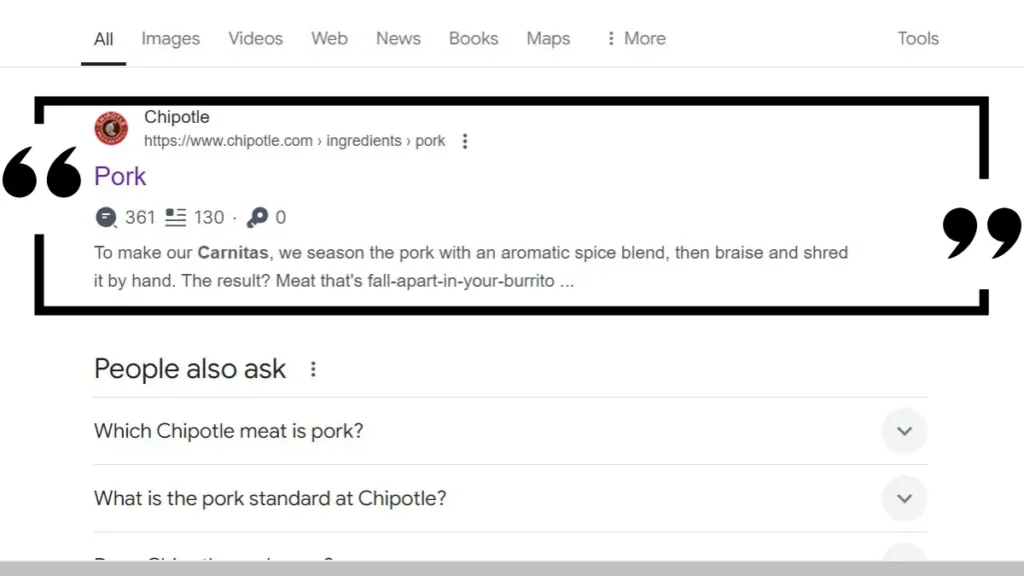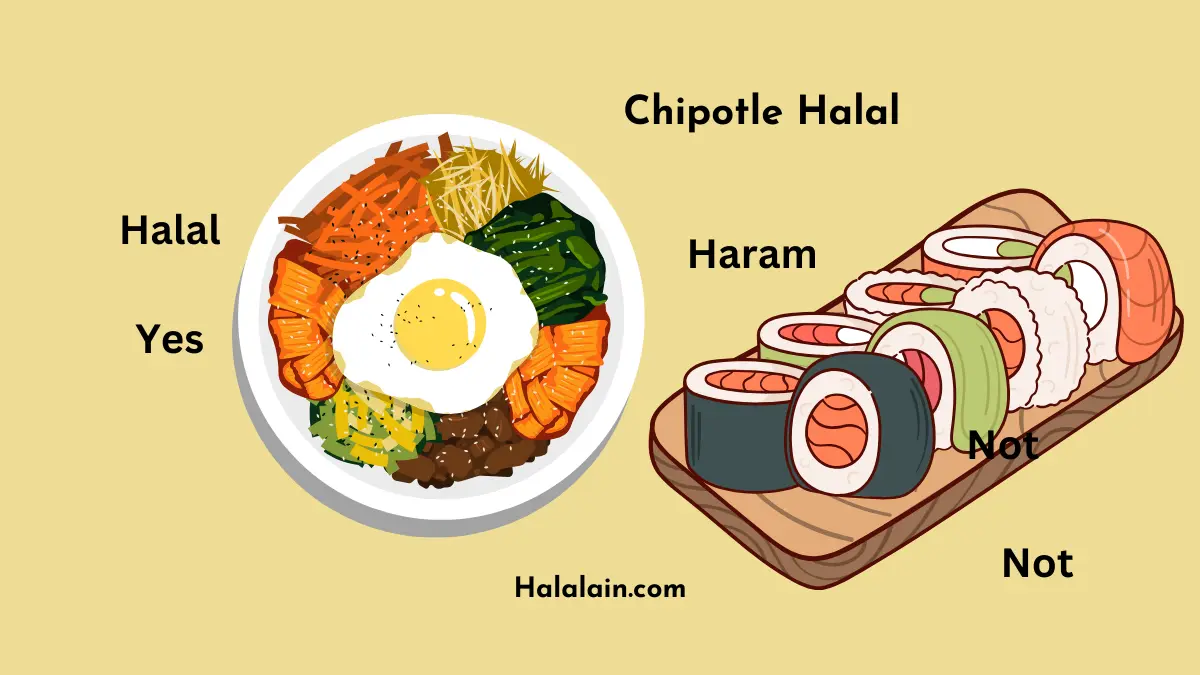For conscientious Muslims, Halal food takes precedence over everything else. And since Chipotle is a hugely popular food worldwide. So is Chipotle halal? This question is being discussed a lot in Muslim society.
In this blog post, we will thoroughly analyze Chipotle’s ingredients, preparation methods, to determine if it complies with Halal guidelines. Along with Chipotle’s unquestionable halal option, I will also discuss the pros and cons of eating halal. We will attach relevant hadith and fiqh references and FAQ to make the answer acceptable and powerful.
What does halal Chipotle mean?
Halal Chipotle means that no haram ingredients or activities have taken place in the ingredients, preparation method and overall process of this food. More simply, this food is permissible according to Islamic dietary principles. Because the word halal means permitted.
So when the word halal is attached to food, it means food that meets certain criteria, especially in terms of animal slaughter, food ingredients, etc. Also ensure that it is free from substances like alcohol or pork. Foods deviating from these guidelines are considered haram or impermissible foods.
Chipotle’s menu analysis
Chipotle offers a wide variety of Mexican-style food. That includes burritos, bowls, tacos, and salads. By looking at their menu, customers confirm the order from their desired category, such as chicken, or pork, toppings, etc.
Although these choices may seem wide ranging, Chipotle with chicken may be halal, but we will clarify this answer by discussing its other possible harams.
Is Chipotle Halal? Simple answer
No, Chipotle is not Halal. Because meat is the main ingredient of their food. And the source of their meat is not halal. In addition, their other ingredients such as alcohol and some gels are not compatible with the Islamic diet. We discuss it in more detail below.
Read More:
Does Chipotle serve halal meat?
No, Chipotle does not serve Halal meat. First this answer needs to be clarified. Because one of the most important aspects of determining whether Chipotle is halal is to be sure and clearly explain exactly why the meat they serve to make this food is haram.
The meat used to make Chipotle is not halal because, until now, the company that makes Chipotle is not declared as a halal-certified meat supplier. Their chickens are not slaughtered according to Islamic rules. Apart from this, other steaks and proteins do not pass Islamic standards. Additionally, Chipotle uses pork (carnitas) in their menu, which is strictly forbidden in Islam.
So the absence of halal certification for their meat means that any Muslim following the halal diet must avoid eating Chipotle meat.
What is the evidence for our answer?
We believe no answer is acceptable and strong unless it is supported by evidence. So we give evidence here for our answer. First thing is that chipotle’s official website does not mention their food as halal. Check out the screenshot below.

Moreover, the pork they serve is mentioned by themselves. What more evidence is needed outside of this.
Are there any halal alternatives to Chipotle?
Chipotle foods that are made without meat may be halal. But care should be taken that the food is not cross-contaminated with any other haram such as alcohol. These options include:
- Sofritas (organic tofu-based protein)
- Guacamole
- Beans (pinto and black beans)
- Rice (white and brown)
- Fajita vegetables
- Salsa and lettuce
These foods may be halal, ask your nearest Islamic scribe to be more sure. Because there is a risk of cross-contamination during preparation.
Cross-contamination concerns
Cross-contamination occurs when halal and haram items come into contact with each other. In many restaurants, including Chipotle, the same grill or pot is used to prepare both vegetarian options and haram meats such as pork. This poses a challenge for Muslims, who want to avoid non-halal substances in their food.
To reduce the risk, you can ask staff to change their gloves, wash utensils thoroughly, or clean surfaces before preparing your food.
Hadith about Halal food and purity
Islam attaches great importance to the consumption of halal food, as it affects not only physical health but also spiritual strength. In a hadith, the Prophet (peace be upon him) emphasized on halal news, he said,
“O people, Allah is pure and accepts only that which is pure. Allah commands the believers what He commanded the Messengers, saying, ‘O Messengers, eat of pure things and do righteous deeds.’ (Sahih Muslim)
This hadith highlights the importance of ensuring halal food. Because it has a direct impact on our actions and prayers.
Health Benefits of Halal Eating
Eating halal food has several benefits beyond fulfilling religious obligations. Halal food, especially meat, is prepared in a way that ensures the cleanliness and health of the animal. The halal slaughter process ensures that blood is drained from the animal’s veins, reducing the chance of toxins and bacteria in the meat. Additionally, avoiding haram ingredients such as alcohol and pork is associated with a healthy lifestyle.
- Alternatives to Chipotle
If Chipotle’s menu doesn’t meet your halal requirements, there are alternatives. Many halal-certified restaurants offer similar Mexican-style food, including halal tacos, burritos and bowls. In larger cities, you may even find halal-friendly Mexican food chains or local restaurants that cater to Muslim dietary principles.
Some Muslims, on the other hand, prefer to prepare similar dishes at home using halal-certified ingredients. so that they meet all dietary requirements without the risk of cross-contamination.
Choosing Halal over non-Halal restaurants
When eating at a non-halal restaurant like Chipotle, it’s important to take proactive steps to ensure your food is halal:
- Limit to vegetarian or vegan options.
- Request that your food be prepared with fresh gloves and utensils.
- Avoid ingredients that may contain alcohol, gelatin or other haram items.
- Ask the restaurant management if they offer or will introduce halal options in the future.
Frequently Asked Questions
Question 1. Chipotle meat is halal?
No, Chipotle does not serve Halal-certified meat.
Question 2. Can I eat vegetarian food at Chipotle?
Yes, vegetarian and vegan options are generally halal, but be aware of the risk of cross-contamination.
Q3. Are Sofritas at Chipotle Halal?
Sofritas are made from organic tofu and may be halal, but it is important to ensure that it is not contaminated with haram items.
Q4. Can I ask the Chipotle staff to use fresh utensils and gloves?
Yes, you can request workers to change their gloves and use clean utensils, but this does not guarantee complete avoidance of cross-contamination.
Question 5. Are beans and rice halal?
Yes, pinto and black beans are both halal with white and brown rice.
Question 6. Does Chipotle use alcohol in any of its sauces or dressings?
Chipotle doesn’t mention alcohol on its ingredients list, but it’s always best to ask at the specific location you’re dining at.
Question 7. Is chipotle cheese halal?
Chipotle uses cheese that may contain animal rennet. So it is better to take advice to avoid cheese till it is confirmed.
Question 8. Can I eat Chipotle if I’m strict about Halal?
If you’re strict about halal, it’s best to avoid Chipotle due to the risk of cross-contamination and the lack of halal-certified meat.
Question 9. Are Chipotle Tortilla Chips Halal?
Yes, Chipotle’s tortilla chips are made from simple ingredients like corn, salt and oil, so they are halal.
Question 10. Will Chipotle offer halal options in the future?
There is no official statement from Chipotle about future halal offerings, but you can always express interest in halal options to their manager.
Conclusion
Chipotle is not totally halal and not totally haram. They offer some halal-friendly vegetarian and vegan options. However, it is haram due to the lack of halal-certified meat and the risk of cross-contamination.
Until Chipotle introduces halal-certified meat or takes measures to prevent cross-contamination, it should be avoided. Should proceed with caution or explore alternatives. Always remember that Halal selection is not only necessary to fulfill religious obligations but also to maintain physical and spiritual purity.

